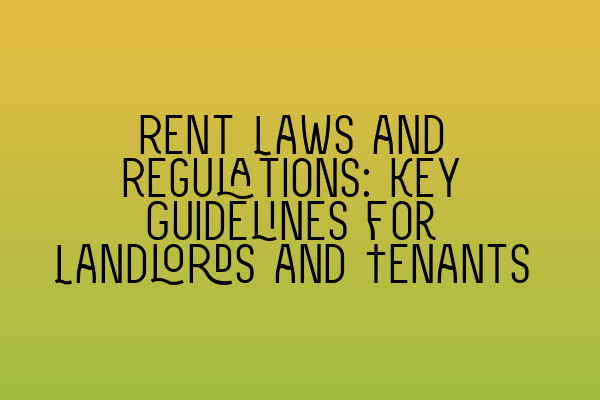Rent Laws and Regulations: Key Guidelines for Landlords and Tenants
As a landlord or tenant, understanding the laws and regulations that govern rent is crucial for a smooth and legally compliant renting experience. Rent laws aim to protect the rights and interests of both parties involved in a rental agreement. In this article, we will discuss the key guidelines for landlords and tenants to ensure a fair and lawful rental relationship.
1. Rental Agreements:
A rental agreement is a legal contract between a landlord and a tenant. It outlines the terms and conditions of the rental, including rent amount, payment schedule, duration of tenancy, and any additional provisions agreed upon. Both parties should carefully review and understand the terms of the rental agreement before signing. It is advisable for landlords and tenants to seek legal advice to ensure compliance with relevant laws and regulations.
2. Rent Amount and Increases:
The rent amount should be agreed upon between the landlord and tenant in the rental agreement. In some cases, rent may be subject to local rent control laws, which limit the amount landlords can increase rent by a certain percentage each year. It is important for landlords to be aware of these regulations and adhere to them. Tenants should be familiar with their rights regarding rent increases and seek legal counsel if they believe their rent is being unfairly raised.
3. Security Deposits:
When renting a property, landlords often require tenants to pay a security deposit. This deposit serves as a financial protection for the landlord in case of property damage or unpaid rent. There are regulations governing security deposits, such as the maximum amount that can be charged and the timeframe within which it must be returned at the end of the tenancy. Both landlords and tenants should familiarize themselves with these regulations to ensure compliance.
4. Maintenance and Repairs:
Landlords have a legal obligation to maintain their rental properties in a safe and habitable condition. This includes maintaining electrical systems, plumbing, heating, and other essential facilities. If repairs are needed, landlords should address them promptly. Tenants should report any maintenance issues to their landlords in writing and allow a reasonable amount of time for repairs to be made. In some cases, tenants may have the right to withhold rent or terminate the tenancy if repairs are not carried out within a reasonable timeframe.
5. Evictions and Termination of Tenancy:
Both landlords and tenants should be aware of the laws and regulations concerning evictions and termination of tenancy. Landlords must follow the proper legal procedures when evicting a tenant, which may include providing written notice and obtaining a court order. Tenants also have rights and procedures to follow if they wish to terminate their tenancy, such as providing proper notice and adhering to any contractual obligations.
6. Discrimination and Fair Housing:
It is essential for landlords to comply with fair housing laws that prohibit discrimination based on protected characteristics such as race, religion, gender, disability, and more. Landlords should treat all applicants and tenants fairly and equally, without discrimination. Tenants who believe they have been discriminated against should seek legal advice and report any violations to the appropriate authorities.
Understanding and complying with rent laws and regulations is vital for both landlords and tenants in order to maintain a harmonious and legally compliant renting relationship. For further guidance, legal advice, or assistance, you can reach out to SQE Property Law & Land Law, experts in property law matters. They offer services that cover all aspects of landlord-tenant relationships, including drafting rental agreements, advising on rent increases, handling eviction procedures, and more.
For more information on the SQE exams, practice questions, and preparation courses, you can check out the following related articles:
– SQE 1 Practice Exam Questions
– SQE 1 Practice Mocks FLK1 FLK2
– SQE 2 Preparation Courses
– SQE 1 Preparation Courses
– SRA SQE Exam Dates
Remember, staying informed and compliant with rent laws is crucial for a successful renting experience.
